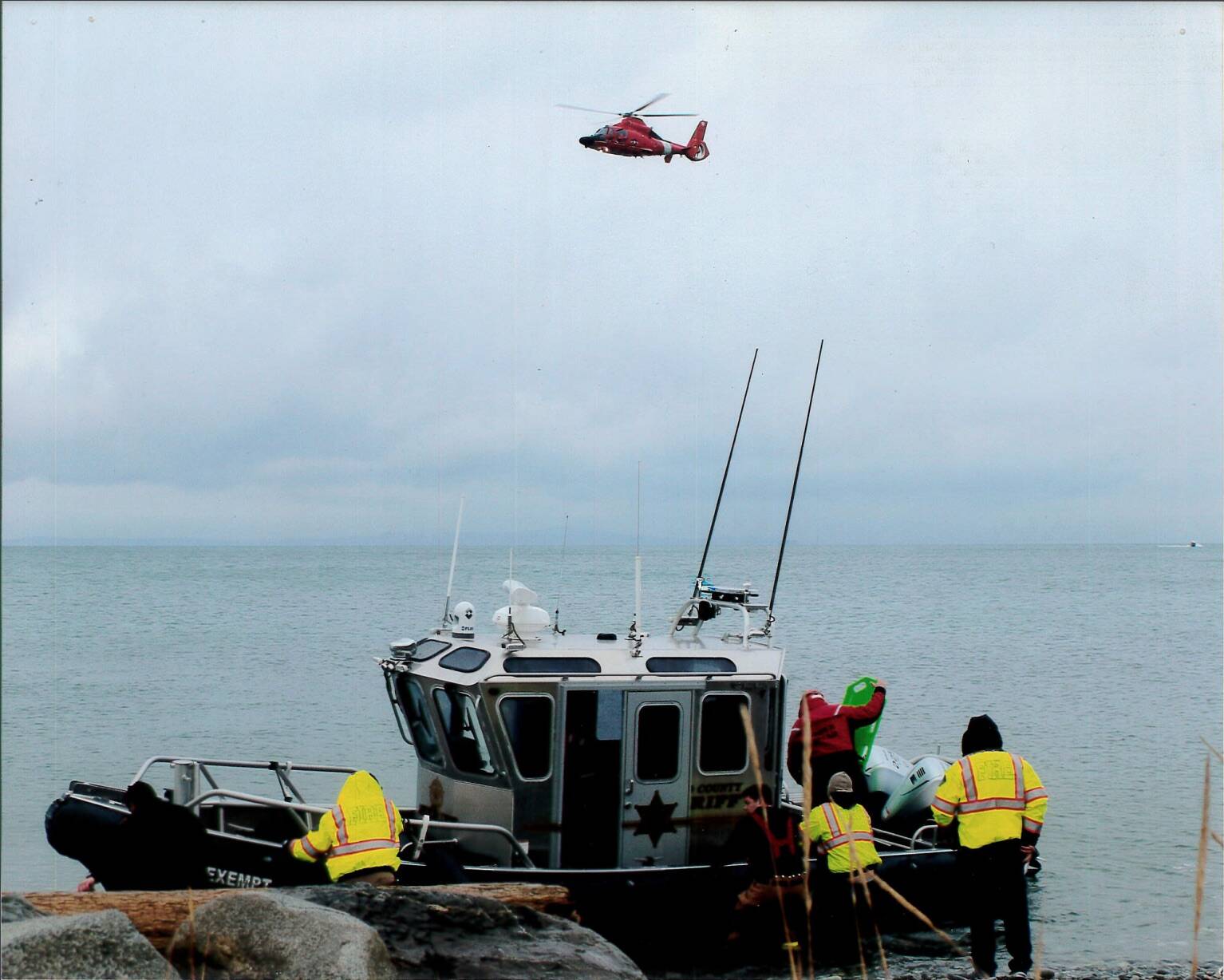Sgt. Chris Garden was out on a routine patrol with the Island County Sheriff’s Office Marine Unit near Rosario Beach one day last summer when he noticed a distressing sight — a man, clinging to a rock out in the water, with no way back to shore.
When he got closer, Garden saw the man was shaking, and his skin was torn up from scraping against the barnacles encrusted on the rock’s surface as he fought to keep himself above water.
After pulling him aboard the rescue vessel, Garden learned that the man was from the Seattle area and had been the victim of a kayaking trip gone wrong. His kayak — a Walmart purchase better suited for a calm lake than the unpredictable waters of Puget Sound — had flipped over, and he had not known how to right it.
The kayaker did not have any means to contact anyone or call for help on his person in the water, Garden said; it was pure luck that the marine unit happened to be passing by.
“Had we not been there, I’m not sure it would have been a positive outcome, because nobody else really was out there at that point in time,” Garden said.
This man’s story is becoming increasingly common to Garden and other marine rescue personnel. Kayakers, canoers and paddle-boarders frequently get swept up in the brutal currents of Deception Pass while exiting Bowman Bay and need to be rescued from the strong eddies under the bridge. Many of these, Garden said, are inexperienced kayakers who did not adequately prepare to go out on the water.
The COVID-19 pandemic brought about an increase in the use of personal watercraft, especially human-powered vessels such as paddleboards and kayaks, Garden said.
The influx of dilettantes brought with it a slew of mishaps. According to data from Washington State Parks, a total of 125 boating accidents were reported last year. Of those, 71 injuries and 27 deaths occurred. Total reported property damage came to a little over $2 million.
Unfortunately, while the pandemic provided the time and opportunity for many people to pick up some outdoorsy hobbies, it also cancelled classes that taught important boating safety skills. While people from Seattle and surrounding urban areas may have seen Whidbey as an idyllic getaway, many were unprepared for the tough conditions out on the water, or the unpredictable weather common to the area.
For those new to operating recreational, human-powered watercraft, Garden recommended starting on inland lakes, such as Cranberry Lake in Deception Pass State Park, which aren’t affected by the same aggressive currents as Puget Sound and connected bodies of water. Sheltered areas such as Oak Harbor Bay and Penn Cove are also good options, provided one stays near the beach.
The Deception Pass area, the Saratoga Passage and unsheltered locations around Whidbey Island are not safe for beginners, Garden said. Even experienced kayakers have forgone these rough-water locations during adverse weather conditions.
Regardless of one’s skill or experience level, Garden said anyone embarking on a kayak or paddle-boarding trip should bring a buddy, if possible. If going alone, paddlers should inform someone of where they’re going and when they expect to be back.
Paddlers of all experience and skill levels should also keep certain equipment with them at all times, including a life jacket that fits well, a noise-making device such as a horn or whistle that can be used to signal distress, a white navigation light for use during low visibility events such as fog or heavy rain, and a nighttime visual distress signal such as a flare.
Garden also cautioned prospective paddlers to check the weather ahead of time and, whenever possible, talk to people familiar with the area before setting off.
“My goal in marine safety is to not have to tell another family member that their loved one was lost in a boating mishap,” Garden said.
Boaters operating motorized vessels should take similar precautions. For boaters interested in learning more about boating safety and becoming certified to operate a motorized vessel on the water, the America’s Boating Club of Deception Pass is hosting a two-day skills and certification course from 9 a.m. to 5 p.m.on Saturdays April 2 and 9 at the Oak Harbor Yacht Club. Registration costs $40 and can be completed online at http://www.deceptionpasssailandpowersquadron.com/square-payments.html. The deadline to register is March 26.
Washington state law requires recreational boaters to complete a boating safety course and carry a Washington State Boater Education Card. Successful completion of the course will qualify individuals for the Washington State Boater Education Card.
Washington state law requires boaters to have a Boater Education Card if they operate a vessel with a 15-horsepower or greater motor, were born after Jan. 1, 1955 and are 12 years of age or older.
Course instructor Jerry Liggett says this is much more than just a “pass-the-test, get-your-card” course. According to Liggett, it’s the most comprehensive introductory boating course available and will give novice boaters the skills needed to enjoy their time on the water and boat with confidence.



